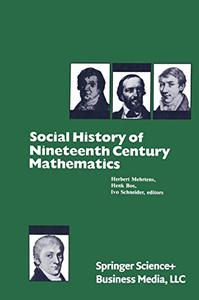
Social History of Nineteenth Century Mathematics by Herbert Mehrtens, Henk Bos, Ivo Schneider
English | PDF | 1981 | 307 Pages | ISBN : 0817630333 | 20.2 MB
During the last few decades historians of science have shown a growing interest in science as a cultural activity and have regarded science more and more as part of the gene ral developments that have occurred in society. This trend has been less evident arnong historians of mathematics, who traditionally concentrate primarily on tracing the develop ment of mathematical knowledge itself. To some degree this restriction is connected with the special role of mathematics compared with the other sciences; mathematics typifies the most objective, most coercive type of knowledge, and there fore seems to be least affected by social influences. Nevertheless, biography, institutional history and his tory of national developments have long been elements in the historiography of mathematics.
During the last few decades historians of science have shown a growing interest in science as a cultural activity and have regarded science more and more as part of the gene ral developments that have occurred in society. This trend has been less evident arnong historians of mathematics, who traditionally concentrate primarily on tracing the develop ment of mathematical knowledge itself. To some degree this restriction is connected with the special role of mathematics compared with the other sciences; mathematics typifies the most objective, most coercive type of knowledge, and there fore seems to be least affected by social influences. Nevertheless, biography, institutional history and his tory of national developments have long been elements in the historiography of mathematics. This interest in the social aspects of mathematics has widened recently through the stu dy of other themes, such as the relation of mathematics to the development of the educational system. Some scholars have begun to apply the methods of historical sociology of knowledge to mathematics; others have attempted to give a ix x Marxist analysis of the connection between mathematics and productive forces, and there have been philosophical studies about the communication processes involved in the production of mathematical knowledge. An interest in causal analyses of historical processes has led to the study of other factors influencing the development of mathematics, such as the f- mation of mathematical schools, the changes in the profes- onal situation of the mathematician and the general cultural milieu of the mathematical scientist.
Links are Interchangeable - No Password - Single Extraction



